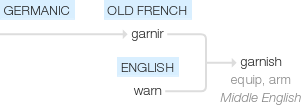Garnish
Middle English (in the sense ‘equip, arm’): from Old French garnir, probably of Germanic origin and related to warn. garnish (sense 1 of the verb) dates from the late 17th century.
wiktionary
From Middle English garnischen, from Old French garniss-, stem of certain forms of the verb garnir, guarnir, warnir(“to provide, furnish, avert, defend, warn, fortify, garnish”), from a conflation of Old Frankish *warnjan(“to refuse, deny”) and *warnōn(“warn, protect, prepare, beware, guard oneself”), from Proto-Germanic *warnijaną(“to worry, care, heed”) and Proto-Germanic *warnōną(“to warn”); both from Proto-Indo-European *wer-(“to defend, protect, cover”). Cognate with Old English wiernan(“to withhold, be sparing of, deny, refuse, reject, decline, forbid, prevent from, avert”) and warnian(“to warn, caution, take warning, take heed, guard oneself against, deny”). More at warn.
etymonline
garnish (v.)
late 14c., "to decorate, adorn, beautify," also in Middle English "equip (a place) for defense; arm (oneself) for battle; prepare to defend," from Old French garniss-, present participle stem of garnir "provide, furnish; fortify, reinforce" (11c.), from Frankish *warnjan, from Proto-Germanic *warnon "be cautious, guard, provide for" (source also of Old High German warnon "to take heed," Old English warnian "to take warning, beware;" see warn), from PIE root *wer- (4) "to cover."
Sense evolution is from "arm oneself" to "fit out" to "embellish," which was the earliest meaning in English. Culinary sense of "to decorate a dish for the table" predominated after c. 1700. Older meaning survives in legal sense of "to warn or serve notice of attachment of funds" (1570s). Related: Garnished; garnishing.
garnish (n.)
late 14c., "set of tableware" (probably a dozen; usually pewter), from garnish (v.). Sense of "embellishments to food" is from 1670s.
